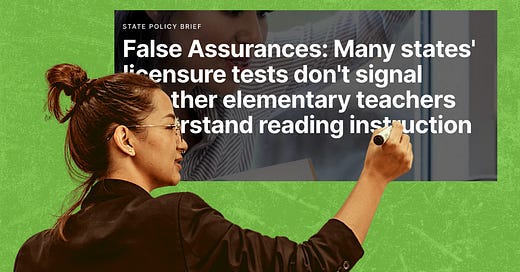Study: States do a poor job of assessing if their teachers can teach reading
The National Council on Teacher Quality finds that 60% of tests for teachers who will teach reading are 'weak.'
I'm just as guilty as anyone about getting caught up in education issues that revolve more around politics and personalities than programs and performance. This post is a slight correction of that tendency.
I received an email yesterday that could have easily ended up in the "read later" folder I use for studies and research from partners, which I often don't get around to reading. However, I spent a few minutes reading it this time because I was coincidentally writing about reading instruction, and I noticed that term in the email.
The gist: in our schools, teachers are the ones who help us learn, especially when it comes to reading.
But, there’s a problem – a recent study by the National Council on Teacher Quality (NCTQ) found that some states are doing a poor job of equipping teachers to teach reading.
The study is called "False Assurances: Many States' licensure tests don't signal whether elementary teachers understand reading instruction." It shows that the reading tests for elementary teachers in some states need to be far more challenging.
Why Teaching Reading Right Matters
Teaching kids how to read is not just about reading books; it's about giving them a skill they'll use to learn in many other domains. Using the right methods to teach reading is a big deal because it can help over a million more students become strong readers by the time they reach the 4th grade each year. That's a lot of kids, and a lot of lives on the line.
What the Study Found
Let's break down the important notes - as I see it - from the NCTQ report:
Weak Tests: Out of the 25 reading tests used in different states, 60% (or 15) are considered weak.
Few Acceptable Tests: Only six tests are rated as "strong," and four are "acceptable."
Not Covering Everything: Among the weak tests, ten only cover some of the five critical aspects of reading.
Too Mixed Up: Five tests combine reading with other subjects like social studies or science. This can make it harder for teachers to focus on teaching reading.
Wrong Stuff: To make things even trickier, one test focuses on stuff that doesn't help teachers teach reading the right way.
What Can Be Done?
The good news is that the NCTQ report isn't just about problems – it also has some ideas for how to fix things:
Make Tests Tougher: States should make their tests for elementary teachers more challenging, especially regarding reading.
Keep It Clear: Tests should focus on reading and not mix it with other subjects.
Use What Works: Tests should follow research methods that are the best for teaching reading.
Keep Improving: States should keep checking and improving their tests always to match the latest and best ways to teach reading.
Bottom line:
NCTQ's report is a big call to action in an area of education policy that isn’t likely to catch fire in the national debate, but that’s not because reading instruction is unimportant. It’s because our discussions are too facile. If we care about kids, we’ll grow up and tend to the underlying issues keeping our students from excelling, even when the topics are unsexy.
Ensuring our teachers are ready to help kids become fantastic readers would move us far down the field toward our achievement goals. That means we need reading tests for teachers that show if they know how to teach reading correctly. When smart folks like those at NCTQ give us the insights we need on hidden (or not so hidden, but undervalued) issues like this one, we’d do ourselves a great service by pushing for the systemic changes they suggest we should make.
It’s for the kids, remember?





